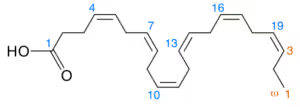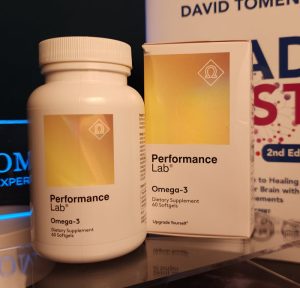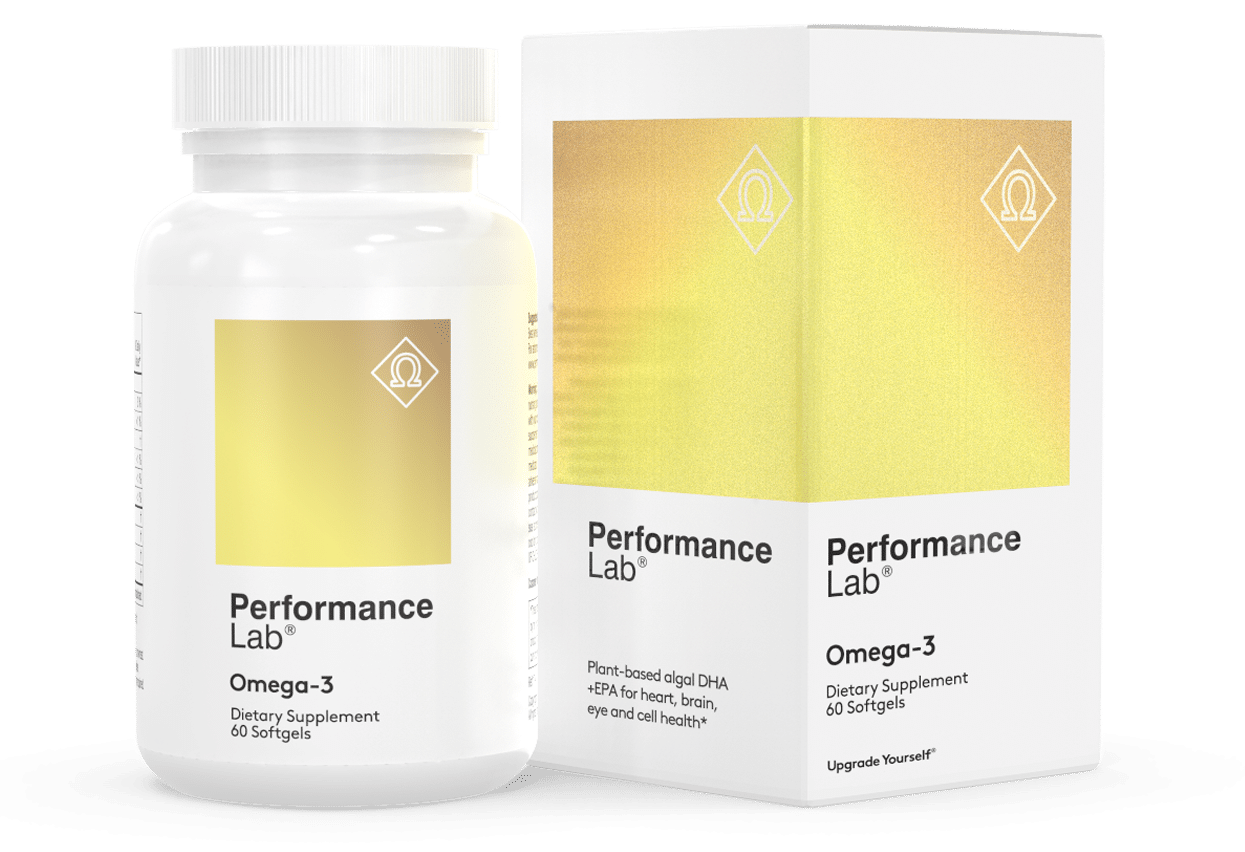Table of Contents
DHA (docosahexaenoic acid) is an omega-3 fatty acid. DHA is crucial for the healthy structure and function of your brain at all ages.
DHA impacts your brain’s signaling systems, neurotransmitters, memory, learning, focus and attention. It helps reduce and even repair cognitive decline.
The best algae-sourced DHA on the market today is Performance Lab® Omega-3 which contains 600 mg of DHA and 300 mg of EPA per dose.
The famous Framingham Heart Study followed-up with 899 men and women who were free of dementia. Subjects had a median age of 76 years. And were followed for 9.1 years for the development of dementia and Alzheimer’s Disease.
Results from the study showed 99 new cases of dementia including 71 of Alzheimer’s. The researchers concluded that those with the highest levels of DHA were “associated with a significant 47% reduction in the risk of developing all-cause dementia”.[i]
DHA helps:
- BDNF. Brain-derived neurotrophic factor (BDNF) is your brain’s growth hormone. DHA has the ability to turn on your brain’s BDNF.
- Neuroplasticity. DHA helps your brain build new neural pathways. Critical for maintaining a healthy brain. And optimizing neural signaling and cognition.
- Neuroprotection. DHA acts as an anti-inflammatory by reducing the enzyme COX-2. Inflammation is a key factor in both Alzheimer’s and Parkinson’s Disease. And in every other neurodegenerative disease.
What is DHA?
DHA (docosahexaenoic acid) is an omega-3 fatty acid. Your brain is made up of 60% fat. And much of that fat is DHA.

Your body does not make DHA on its own. So you must get it from food or a supplement. And if you are a vegan, you are at serious risk of a life-threatening DHA deficiency.
Foods that are rich in DHA include fish, fish oil, Krill and other crustaceans, and algae.
But fish do not make DHA. Fish and other marine predators get it from smaller fish and crustaceans that feed on algae. It’s algae that has the enzymes to produce DHA that we need to remain healthy.
The best algae-sourced DHA on the market today is Performance Lab® Omega-3 which contains 600 mg of DHA and 300 mg of EPA per dose.
DHA from eggs and some dairy products only supply about 20 mg of DHA per day.
DHA is essential for maintaining brain health, memory and learning functions. DHA reduces brain inflammation, stimulates new nerve cell growth, and assists in brain cell repair.
How does DHA Work in the Brain?
Your brain is composed of 60% fat. 15 – 20% of your cerebral cortex is DHA. Even the retina in your eyes is 30 – 60% DHA. Making DHA the most essential nutrient for eye and brain health.
The highest levels of DHA are found in phosphatidylserine (PS) and phosphatidylethanolamine (PE).[ii] Lower levels are found in phosphatidylcholine (PC).
PS makes up about 70% of neuron tissue mass. It helps in the storage, release and activity of neurotransmitters and receptors.
PC also makes up part of the neuron tissue mass. And helps in maintaining cell structure, fat metabolism, neuron signaling and the activation of a number of enzymes.
And PE is part of neuron cell membranes. PE is involved in cellular signaling.
PS, PE and PC are called phospholipids. Together they alter the fluidity of cell membranes. Changing the fluidity of cell membranes alters their permeability and protein activity. And influences cellular signaling.
Made up largely of DHA, these cellular membranes regulate entry into the cell, and control neuroreceptor function. Which facilitates cellular communication between, and within cells.
DHA also reduces inflammation by regulating proteins and enzymes within cells. And boosts the production of anti-inflammatory compounds that protect cells.
DHA maintains the activity of certain enzymes that control electrical signaling between cells. And it regulates the brain cell concentration of PS which is vital for cell survival.
And DHA regulates calcium oscillations, which are involved in neurotransmitter release, mitochondrial function, gene activation, oxidative stress and brain cell development and growth (BDNF).
DHA vs. EPA: What’s the Difference?
Most medical authorities and scientists agree that Omega-3 oils are important for good health. Omega-3s boost brain function, decrease inflammation, reduce the incidence of fatal heart attacks and strokes, help autoimmune diseases and improve vision.
 We have general agreement about the health benefits of Omega-3 oils. But few appreciate the difference between DHA (docosahexaeonic acid) and EPA (eico-sapentaenoic acid).
We have general agreement about the health benefits of Omega-3 oils. But few appreciate the difference between DHA (docosahexaeonic acid) and EPA (eico-sapentaenoic acid).
The ratio of DHA and EPA varies a lot in commercial Omega-3 supplements. Most have higher concentrations of EPA to DHA. Mainly because it’s cheaper to manufacture, and has less of a fishy odor.
But studies show that most of the brain health benefits of Omega-3’s are derived from DHA rather than EPA.
One study in Chicago followed 815 residents from 1993 – 2000. Study subjects were between 65 and 94 years. 131 study participants developed Alzheimer’s Disease. Those who ate fish at least once a week had a 60% less risk of Alzheimer’s compared to those who didn’t eat fish.
Researchers found that it was the intake of DHA rather than EPA that reduced the risk factor in getting Alzheimer’s. EPA made no difference whatsoever.[iii]
How Things Go Bad
From reviewing the “How does DHA Work in the Brain” section of this article, you can imagine that when things go bad with DHA – they go really bad.
Fish and marine oil supplements like krill oil are a source of DHA and EPA because they get it from algae. Plants contain another Omega-3 called alpha-linolenic acid (ALA).
Technically ALA can be converted to DHA and EPA. But most modern humans lack the ability to convert plant sources of Omega-3s into all the DHA our brain needs.
When we don’t get enough DHA, we experience:
↓ Problems with attention, learning and memory
↑ Depression, anxiety, aggression, anger, suicide risk
↑ Bipolar disorder, Alzheimer’s Disease and Schizophrenia
Not having adequate levels of DHA in the brain cause things to break down. If the inadequate intake of DHA goes on for a while, disease starts to set in. Including neurodegenerative diseases like Alzheimer’s and cancer.
DHA benefits
DHA makes up much of the gray matter in your brain. It’s an integral part of cell membranes and their function.
Your brain is 60% fat. And a large part of that is DHA.
The good news is; degenerative conditions can not only be prevented by adding DHA to your nootropic stack. It can also be reversed.
In one study, researchers worked with 485 elderly subjects with memory problems. They saw significant improvement with those taking 900 mg of DHA per day for 24 weeks compared to the control group.[iv]
In another double-blind, placebo-controlled trial, scientists worked with 49 women aged 60 – 80 years. One group received 800 mg per day of DHA for 4 months.
Researchers found those using DHA had a significant improvement in verbal fluency scores. And an improvement in memory and learning.[v]
How does DHA feel?
Chances are when you start using DHA you won’t feel it. There’s no profound stimulant feeling.
But if you suffer from chronic depression, within a few weeks you should feel the depression lift.
After supplementing with DHA for a while your cognition will be better. You’ll think clearer and quicker. Your memory and ability to learn will improve. And you’ll likely have more energy and motivation.
But it is very likely you won’t think to attribute these improvements to adding DHA to your stack. Something else will get the credit.
DHA Clinical Research
DHA is crucial for an optimally functioning brain. The goal of every neurohacker. DHA impacts your brain’s structure, signaling systems, neurotransmitters, memory, learning, focus and attention.
We have decades of clinical research verifying the importance of DHA in your nootropic stack. And several books have been written on the subject in the last couple of years. Here’s just a snippet of what’s available…
DHA Reduces Hostility and Anger
In a study with 41 university students in Japan, scientists compared a high-DHA diet (1.5 grams/day) with placebo. This was recorded over 3 months to see the effects on hostile responses.
The researchers found a 27% incidence of hostile answers in the placebo group when nothing extraordinary was going on. And hostile responses rose to 92% during final exams.
There was no increase in hostility among those taking a DHA supplement. These guys even found DHA supplementation significantly reduced hostility among university staff.[vi]
DHA Restores Neurotransmitters & Memory
As your brain ages, there is an increase in membrane rigidity. This causes changes in synapses resulting in a decrease in transmitter release. Long-term potentiation is affected which impairs the development of memories.
Several studies have shown that DHA can support healthy levels of these neurotransmitters. In one study with aged rats, researchers restored neurotransmitter release in the hippocampus. And reversed age-related memory problems.
Adding omega-3 fatty acids to the rat’s feed for 8 weeks raised concentrations of DHA in the rat’s brain. And actually reversed age-related memory impairment.[vii]
DHA Improves Attention & Learning
DHA also has an effect on neurotransmitters serotonin, norepinephrine, acetylcholine, glutamate and dopamine. Deficiencies in DHA have been shown to lower levels of dopamine. Resulting in problems with attention and learning.[viii]
DHA even plays a role in neurotransmitter receptor function. DHA affects brain cell membrane structures including neuroreceptors.[ix]
Some of these receptors communicate inside cells when stimulated by glutamate, serotonin and acetylcholine.[x] The numbers of these receptors can be increased by you, by adding DHA to your nootropic stack.
So if you are using nootropics that affect things like acetylcholine, serotonin, dopamine and serotonin in your brain. It would be wise to add DHA to your nootropic stack. And ensure you get the most bang for your investment in nootropics.
DHA Recommended Dosage
Recommended daily dosage of DHA is 1,000 mg.
Fish oil supplements vary in ratios of DHA to EPA. Salmon naturally contain more DHA than EPA. A supplement from algae may contain only DHA.
Krill oil provides both DHA and EPA. So read the labels. And whatever supplement you get, make sure you end up with at least 1,000 mg of DHA.
And recall that fish and krill do not produce DHA on their own. Marine life get their DHA from algae in the wild.
Most brands of fish oil have been proven safe, and free of mercury. And do not contain unsafe levels of PCB’s (polychlorinated biphenyls).
To further avoid the contaminants in an unrefined supplement, choose a fish oil or Omega-3 supplement made from small, oily fish like anchovies, sardines or menhaden. And check the labels carefully for purity.
Ideally, get one of a few supplements now available that are pure, refined DHA. With lower or minimal amounts of EPA.
DHA Side Effects
Fish oil capsules commonly have both DHA and EPA. Capsules with EPA are not recommended for infants or small children. Because they upset the balance between DHA and EPA during early development. This also applies to pregnant women.
Fish oil could cause minor side effects like loose stools, upset stomach and belching.
Fish oil may lower blood pressure. So if you already take a medication to lower blood pressure, make sure you talk to your doctor first.
If you’re supplement contains EPA, it could interact with blood thinners and increase bleeding. Same is true for aspirin. But this is not true of DHA. DHA-only supplements do not thin the blood.
Fish oil supplements may lower blood sugar levels. So be careful if you’re on diabetes medications.
Omega-3 fatty acids may reduce some of the side effects of cyclosporine which is used to stop rejection after an organ transplant.
Type of DHA to Buy
 DHA is available as a supplement in two forms:
DHA is available as a supplement in two forms:
- Fish oil or Omega-3 capsules. Which usually have both DHA and EPA. Most Omega-3 supplements contain higher amounts of EPA compared to DHA. But for our purposes, and to support cognitive health, we need an Omega-3 supplement containing higher amounts of DHA to EPA.
- DHA from fish oil. Some supplement manufacturers now offer capsules containing higher amounts of pure, refined DHA. And reduced amounts of EPA. Our brains require 1,000 mg DHA per day. So look for a DHA supplement that provides 1,000 mg DHA in 2-3 gelcaps.
- DHA from algae. Which may or may not contain EPA and is vegetarian friendly. Algae is the natural source of these Omega-3s in the wild and where fish and other marine life get their Omega-3s.
For as little as $49/month you can experience better cognition, memory and mood simply by using a daily DHA supplement. My favorite is Click for Performance Lab® Omega-3 which contains 600 mg of DHA and 300 mg of EPA per dose.
Performance Lab® Omega-3 contains life’s™ OMEGA algae oil which supplies natural triglyceride Omega-3s that are 70% more bioavailable than synthetic ethyl esters used in cheaper and lower quality Omega-3 fish oil supplements.
Performance Lab® Omega-3 is delivered in NutriGels which are vegan, carrageenan-free softgels. No fishy smell or aftertaste and easy on your digestive system.
Try a bottle today: Click for Performance Lab® Omega-3
Nootropics Expert Recommendation
DHA (Omega-3) 1,000 mg per day.
 I recommend using DHA as a nootropic supplement.
I recommend using DHA as a nootropic supplement.
Your body does not make DHA on its own. So you must get it from food. Or take it as a supplement.
DHA is one of the most important nootropics you can add to your stack. Your brain is 60% fat. And much of that fat is DHA.
DHA is critical for brain cell repair and regeneration (neurogenesis). And it is an integral part of neural signaling. Both between neurons as well as inside brain cells.
DHA has an effect on critical neurotransmitters and neuroreceptors. It is a powerful anti-inflammatory. And is involved in neuroplasticity.
Hundreds of studies on Omega-3s and DHA show benefits in preventing and even reversing neurodegenerative disease.
It’s best if you find a supplement that contains twice as much DHA than EPA. Such as Click for Performance Lab® Omega-3 And you can safely take 1,000 mg of DHA per day.









Join The Discussion - 229 comments
Marcie Webber
April 5, 2022
Thanks David for your response. Therefore Carlson Fish oil still not ideal as it has 500mg DHA and only 100mg EPA.
NOW Foods has ideal ratio except I am not comfortable anything with China resources.
Anyone who finds this ideal gem DHA/EPA 2:! ratio triglyceride form please share. Best with no questionable fillers.Thanks.
David Tomen
April 5, 2022
Marcie, the Carlson supplement will work as long as you double the dose to 1,000 mg DHA. Which helps make more EPA so you’ll be good.
Marcie Webber
April 3, 2022
I have switch to Fish oil from algae. Is Carlson’s Super DHA 500mg good?
Only 100mg EPA tho.
NOW brand: Ideal 500mg and 250mg ratio. But has tuna big fish. Worst has China origin.
Both molecuralized.
Garden of Life has a 1000mg DHA pure . No EPA tho and we don’t want that.
Is Carlson brand acceptable. I would prefer PL but too pricey.
David Tomen
April 4, 2022
Carlson puts out high quality supplements. As long as you are getting 1,000 mg DHA per day and half that of EPA you’ll build your Omega-3 levels to where then need to be.
ilva
March 28, 2022
hell david,
i have been told that liquid form omega 3 is superior to pills. is this true? also are your familiar with the brand nutrasea and would you recommend it?
thank you,
ilva
David Tomen
March 29, 2022
Ilva, most high quality Omega-3 supplements are liquid in a gelcap. So using is in purely liquid form just means it’s not delivered in a gelcap.
I am not familiar with Nutrasea and know nothing of their quality. But just looking at the supplement facts label shows you would need to use 2 teaspoons to get the 1,000 mg DHA that you need daily. With this supplement because they have more EPA than DHA you would end up with 1,500 mg EPA. I’m not sure if that would be helpful to you.
Ctech
March 6, 2022
Hi David,
Not sure where to put this question so adding it here. I have done few Cyrex lab test related to fatigue, brain fog and autoimmune. I need help interpreting the results. Is that something you can advise on during your consultation?
David Tomen
March 7, 2022
I would NOT be much help interpreting the results of Cyrex labs. You need specialized training for that which I have not done. Sorry.
Sandra
January 26, 2022
Greetings David! My omega 3 suplement from sardines in 4 capsules contain 920mg DHA and 1360mg EPA is this bad for my cognition? Should I change it for something else? Is DHA and EPA balance that important?
Big thanks!!
David Tomen
January 26, 2022
Sandra, the balance is not as important as getting as close to 1,000 mg DHA per day as you can.
Bruno
February 21, 2022
Hello David,
I agree with “Capsules with EPA are not recommended for infants or small children. Because they upset the balance between DHA and EPA during early development. This also applies to pregnant women”.
However, the scientific research I have found actually references EPA as being responsible for the cognitive effects vs DHA.
E.g. (2021) Supplementation with oil rich in EPA, but not in DHA, improves global cognitive function in healthy, young adults (29-49 years old): results from randomized controlled trials: https://doi.org/10.1093/ajcn/nqab174
What I found, in conclusion, is that balance is important and that the best studied ratio seems to be EPA:DHA=3:1, since DHA is important as a building material, while EPA performs a regulatory function, supporting the proper functioning of the nervous system.
It seems EPA can be converted easily to DHA in the metabolic process, and EPA also reduces the activity of phospholipase A2, slowing the release of DHA from nerve cell membranes in the brain.
Would love to know what do you think about this,
Thanks and best regards
David Tomen
February 21, 2022
Bruno, EPA is converted into DHA. It’s the other way around: https://www.ncbi.nlm.nih.gov/labs/pmc/articles/PMC3494243/
And you will find studies that show improvements in various cognitive functions from DHA and not EPA: https://pubmed.ncbi.nlm.nih.gov/22018509/. Other studies that show zero benefits from either: https://pubmed.ncbi.nlm.nih.gov/22020134/. And other studies like you pointed to favoring EPA.
All I know is your brain cell membranes are made up of Phosphatidylcholine, Phosphatidylserine and DHA. And EPA is found nowhere in that membrane.
Bruno
February 22, 2022
Thanks David!
Mohammad
December 8, 2021
Hi David,
If I want to use DHA to improve my verbal fluency, is there is any special dosage to get that benefit other than the suggested 1000MG of DHA daily?
also do you suggest anything I can combine DHA with to get an improved effect?
Thanks
Mohammad
December 8, 2021
Hi David,
Please, What would be the best time during the day to take DHA/Omega3 Supplements?
Also is it better to take it with meal, empty stomach, or a spoon of a healthy oil?
Thanks
David Tomen
December 9, 2021
One study above used 800 mg DHA daily for 4 weeks and it improved verbal fluency.
Jose
December 3, 2021
You may find Interesting this meta analysis:
https://ajp.psychiatryonline.org/doi/full/10.1176/appi.ajp.2016.15091228
Seems like EPA is beneficial for depression treatments
David Tomen
December 4, 2021
Jose, there is plenty of evidence that EPA is effective for depression. But DHA is absolutely critical for brain cell membrane health. Every human being needs 1,000 mg DHA per day. EPA on top of the is helpful for those with depression.